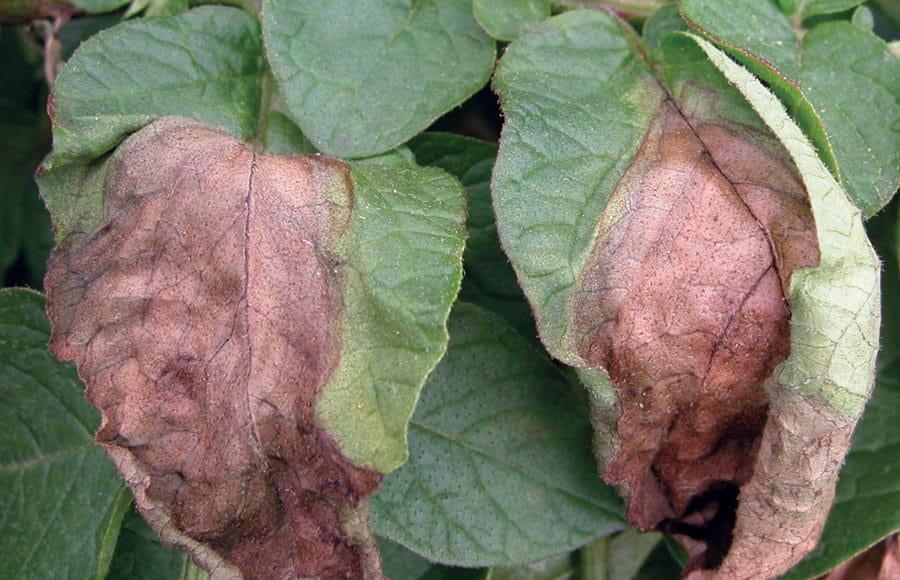Scientists from Wageningen University in the Netherlands and Teagasc, the Irish agricultural research agency, conducted three years of field tests in the two countries to examine the effectiveness of potato genes aiming to confer resistance to Phytophthora infestans, otherwise known as late blight disease. The research has far-reaching implications because potatoes are grown around the world.
Late blight is infamous in Ireland due to its role in helping cause the Irish Potato Famine, which led to the deaths of more than a million people between 1845 and 1849. For Ireland to help conquer potato blight would therefore have a powerfully symbolic resonance.
In modern agriculture, late blight is kept in check via a regime of fungicide sprays, with farmers sometimes having to spray their potato crops as often as once a week during bad blight years. A blight-resistant commercial potato variety — Desiree was the variety chosen for the trials — would therefore help to reduce the environmental burden of agro-chemical sprays, as well as costs to farmers.
Despite the potential for environmental benefits, anti-GMO activists have tried to stop trials in both countries. Activist groups opposed the trials even though the GE Desiree potato was classed as “cisgenic,” meaning the added resistance gene came from a wild potato relative and was therefore within the same species.
In 2011 activists in Belgium invaded and destroyed a field trial of blight-resistant potatoes being carried out by scientists at Ghent University. Field trials in Ireland were also opposed by Friends of the Earth, organic growers and the Irish Green Party, among others. Opponents cited Ireland’s “clean green image” as reason for their resistance, despite the widespread use of fungicide by potato farmers to protect their crops from blight.
Anti-GMO activists have also said the existence of conventionally-bred potato varieties that are highly resistant to blight make the GE varieties unnecessary. The Dutch and Irish scientists also trialled these — the Sarpo mira variety — alongside both susceptible and resistant Desiree potatoes.
The experiments did confirm that conventionally-bred Sarpo mira is “highly blight resistant.” However, the researchers wrote that it has “very limited market share due to a number of sub-optimal agronomic and commercial traits.” In contrast, the cisgenic potato allowed just the genes for blight resistance to be transferred into an established commercial potato variety.
“Cisgenesis allows enrichment of existing potato varieties in as little as three years versus current potato breeding programs that require 10 years or more to produce a novel variety,” according to a Wageningen press release. “In addition to accelerating the breeding process, cisgenesis is more accurate than using conventional crossbreeding and selection methods.”
The scientists found that by using an “integrated pest management” they could reduce fungicide use by 80-90 per cent, compared to conventionally-grown potato. As well as helping the environment, blight-resistant potatoes could help farmers in developing countries where potato is an important part of the diet. Both Uganda and Bangladesh could benefit in the near future, as potato trials are ongoing in both countries.
Their results are published in the paper “Development and validation of IPM strategies for the cultivation of cisgenically modified late blight resistant potato,” published in the May edition of the European Journal of Agronomy.
Source: Cornell University











